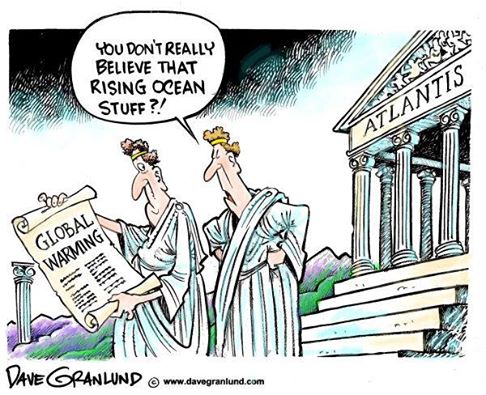2013 SkS Weekly Digest #35
Posted on 1 September 2013 by John Hartz
SkS Highlights
Ari Jokimäki's Global warming...still happening nicely summarizes recent scientific findings about climate change that demonstrate global warming due to mankind's actitivity is continuing unabated. The article also garnered the most comments of the articles posted on SkS during the past week.
Toon of the Week

h/t to I Heart Climate Scientists
Quote of the Week
That’s one of the big outstanding questions on climate change. “We understand the physics of simple things like how oceans become acidic,” said Richard Norris, a paleobiologist at Scripps Institution of Oceanography, UC San Diego. “But when it comes to how ecosystems might react, that’s big and complex and messy, with all these interactions going on, both physiological and how organisms interact with each other.”
The oceans are acidifying at the fastest rate in 300 million years. How worried should we be? by Brad Plumer, The Wonk Room, Washington Post, Aug 31, 2013
SkS Week in Review
- 2013 SkS Weekly News Roundup #35B by John Hartz
- Global warming...still happening by Ari Jokimäki
- Abraham et al. (2013) explore the known unknowns in the oceans and global warming by John Abraham
- The Beginners Guide to Representative Concentration Pathways - Part 3 by gpwayne
- 2013 SkS Weekly News Roundup #35A by John Hartz
- The Beginners Guide to Representative Concentration Pathways - Part 2 by gpwayne
- The Beginners Guide to Representative Concentration Pathways - Part 1 by gpwayne
Coming Soon
- Moncking up the Numbers (Rob Honeycutt)
- The Pacific Ocean fills in another piece of the global warming puzzle (Dana)
- 2013 SkS Weekly News Roundup #36A (John Hartz)
- Why I Resigned from the Editorial Board of Climate over its Akasofu Publication (Chris Brierly)
- Free Staged Reading of a new Climate Change Play - Extreme Whether in New York September 10th (Sonya Landau)
- Global imprint of climate change on marine life (John Bruno)
- 2013 SkS Weekly News Roundup #36B (John Hartz)
Down the Road
- The 2012 State of the Climate is easily misunderstood (MarkR)
- How did Ancient Coral Survive in a High CO2 World? (Rob Painting)
- Why Atmospheric CO2 matters: The Really Big Picture (Chris Colose)
- Study offers clues on 20th century global warming wobbles (Merran Reed and Sunanda Creagh)
SkS in the News
A new peer-reviewed paper, Practical Challenges of Sustainable Human Development: Community-driven Development as Response, referenced Cook et al. (2013).
The 97% consensus was also referenced by Real Sceptic, Wotts Up With That Blog, HotWhopper, and Hazme el Chingado Favor.
Chris Mooney at Mother Jones used the SkS graphic showing where global warming is going.
Planet 3.0 referenced Chris Colose's Toward Improved Discussions of Methane & Climate.
PolitiFact Rhode Island made use of the SkS temperature trend calculator.
RenewEconomy referenced Graham Wayne's Carbon Economics and the Cost of Inaction.
John Mashey at DeSmogBlog referenced the SkS rebuttal to the myth 'Murry Salby finds the CO2 rise is natural'.
SkS Spotlights
The European Climate Foundation (ECF) was established in early 2008 as a major philanthropic initiative to promote climate and energy policies that greatly reduce Europe’s greenhouse gas emissions and to help Europe play an even stronger international leadership role to mitigate climate change.
The ECF aims to significantly drive the transformation of Europe to a low carbon economy, which means reducing greenhouse gas (GHG) emissions in Europe by 30% in 2020 and at least 80% in 2050.
The ECF does so by developing and implementing well-crafted climate and energy policies that greatly reduce Europe's global greenhouse gas emissions. Key elements of a sustainable energy future include: (1) a substantial increase in energy efficiency, (2) a successful transition from conventional to renewable energy; (3) maintenance of the earth’s ecological systems and the life-supporting services they provide; and, (4) equitable distribution of energy services to different members of the population, both internationally and within nations.
We build alliances among a wide range of partners in government, business and the NGO sector. Our programme staff collaborate with grantees and experts from the field to design and fund sophisticated strategies based on a thorough understanding of decision-makers, decision-making processes and political pressure points.
The majority of the ECF’s fund is re-granted to NGOs engaged in trying to bring about meaningful policy change. We choose strategies that can win the most effective and implementable policies based on rigorous analysis undertaken by our expert staff. When we see an unfulfilled need we also engage in direct initiatives, such as commission papers, convene meetings or support a new organisation.
The ECF is affiliated with the ClimateWorks Network and is the core of the ClimateWorks system in Europe. The ClimateWorks Foundation supports public policies that prevent dangerous climate change and promote global prosperity.































 Arguments
Arguments






























I noticed that when my website is referenced that it's pointing to some internal link on SkS that apparently requires a login. For anyone that is interested you can find the referenced blog post here.
Collin Maessen: Link fixed. Thank you for bringing this to our attention. Also, thank you for all that you do.
Cheers. :)
The bad link was serendipitous for me. I clicked the link in comment 1 and found something I want to follow. Thanks for the link error and resulting comment!